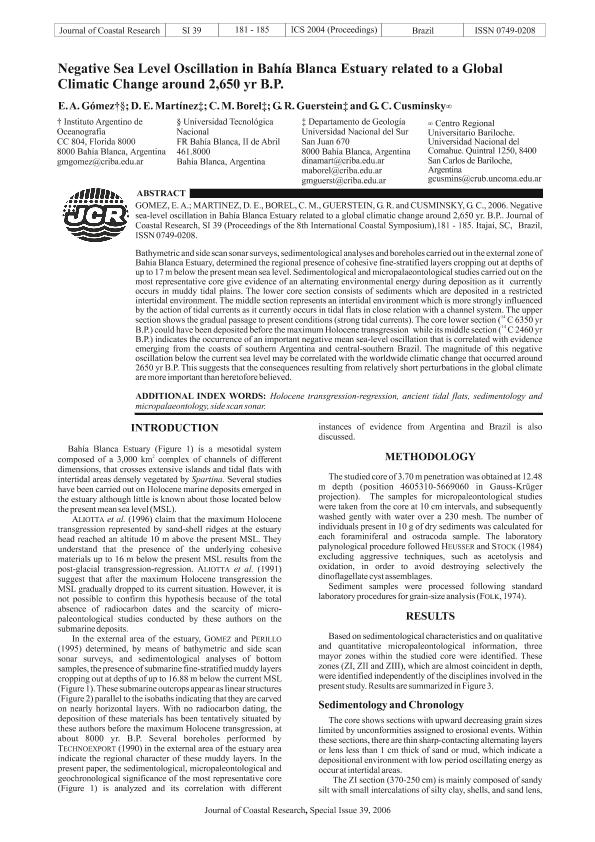Mostrar el registro sencillo del ítem
dc.contributor.author
Gomez, Eduardo Alberto

dc.contributor.author
Martinez, D. E.
dc.contributor.author
Borel, Claudia Marcela

dc.contributor.author
Guerstein, Gladys Raquel

dc.contributor.author
Cusminsky, Gabriela Catalina

dc.date.available
2017-12-14T15:21:35Z
dc.date.issued
2006-12
dc.identifier.citation
Gomez, Eduardo Alberto; Martinez, D. E.; Borel, Claudia Marcela; Guerstein, Gladys Raquel; Cusminsky, Gabriela Catalina; Negative sea level oscillation in Bahía Blanca Estuary related to a Global
Climatic Change around 2,650 yr B.P; Coastal Education & Research Foundation; Journal Of Coastal Research; 39; 12-2006; 181-185
dc.identifier.issn
0749-0208
dc.identifier.uri
http://hdl.handle.net/11336/30593
dc.description.abstract
Bathymetric and side scan sonar surveys, sedimentological analyses and boreholes carried out in the external zone of Bahía Blanca Estuary, determined the regional presence of cohesive fine-stratified layers cropping out at depths of up to 17 m below the present mean sea level. Sedimentological and micropalaeontological studies carried out on the most representative core give evidence of an alternating environmental energy during deposition as it currently occurs in muddy tidal plains. The lower core section consists of sediments which are deposited in a restricted intertidal environment. The middle section represents an intertidal environment which is more strongly influenced by the action of tidal currents as it currently occurs in tidal flats in close relation with a channel system. The upper section shows the gradual passage to present conditions (strong tidal currents). The core lower section (¹⁴ C 6350 yr B.P.) could have been deposited before the maximum Holocene transgression while its middle section (¹⁴ C 2460 yr B.P.) indicates the occurrence of an important negative mean sea-level oscillation that is correlated with evidence emerging from the coasts of southern Argentina and central-southern Brazil. The magnitude of this negative oscillation below the current sea level may be correlated with the worldwide climatic change that occurred around 2650 yr B.P. This suggests that the consequences resulting from relatively short perturbations in the global climate are more important than heretofore believed.
dc.format
application/pdf
dc.language.iso
eng
dc.publisher
Coastal Education & Research Foundation

dc.rights
info:eu-repo/semantics/openAccess
dc.rights.uri
https://creativecommons.org/licenses/by-nc-sa/2.5/ar/
dc.subject
Sedimentology
dc.subject
Micropaleontology
dc.subject
Sea Level Fluctuations
dc.subject
Holocene
dc.subject.classification
Meteorología y Ciencias Atmosféricas

dc.subject.classification
Ciencias de la Tierra y relacionadas con el Medio Ambiente

dc.subject.classification
CIENCIAS NATURALES Y EXACTAS

dc.title
Negative sea level oscillation in Bahía Blanca Estuary related to a Global
Climatic Change around 2,650 yr B.P
dc.type
info:eu-repo/semantics/article
dc.type
info:ar-repo/semantics/artículo
dc.type
info:eu-repo/semantics/publishedVersion
dc.date.updated
2017-11-21T13:56:39Z
dc.journal.volume
39
dc.journal.pagination
181-185
dc.journal.pais
Estados Unidos

dc.journal.ciudad
Florida
dc.description.fil
Fil: Gomez, Eduardo Alberto. Consejo Nacional de Investigaciones Científicas y Técnicas. Centro Científico Tecnológico Conicet - Bahía Blanca. Instituto Argentino de Oceanografía. Universidad Nacional del Sur. Instituto Argentino de Oceanografía; Argentina
dc.description.fil
Fil: Martinez, D. E.. Universidad Nacional del Sur; Argentina
dc.description.fil
Fil: Borel, Claudia Marcela. Universidad Nacional del Sur; Argentina
dc.description.fil
Fil: Guerstein, Gladys Raquel. Universidad Nacional del Sur; Argentina
dc.description.fil
Fil: Cusminsky, Gabriela Catalina. Universidad Nacional del Comahue; Argentina
dc.journal.title
Journal Of Coastal Research

dc.relation.alternativeid
info:eu-repo/semantics/altIdentifier/url/http://www.jstor.org/stable/25741558
Archivos asociados
